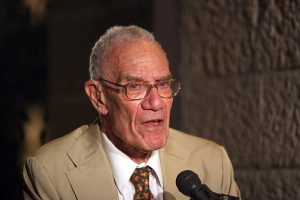Introduction The world mourns the loss of a titan in the field of economics as Nobel Prize-winning economist Robert Solow has passed away. This article pays tribute to his extraordinary life, remarkable contributions to economic theory, and the enduring impact he leaves on the realm of economics. A Life of Achievement: 1. Nobel Laureate: Robert
Introduction
The world mourns the loss of a titan in the field of economics as Nobel Prize-winning economist Robert Solow has passed away. This article pays tribute to his extraordinary life, remarkable contributions to economic theory, and the enduring impact he leaves on the realm of economics.
A Life of Achievement:
1. Nobel Laureate:
Robert Solow was awarded the Nobel Prize in Economic Sciences in 1987, recognizing his groundbreaking contributions to the understanding of economic growth and development.
2. Growth Theory Pioneer:
Solow’s work on economic growth theory, particularly the Solow model, has been instrumental in shaping how economists comprehend the dynamics of long-term economic development.
3. Academic Legacy:
As a distinguished academic, Solow’s influence extended through his teaching and mentorship, inspiring generations of economists to explore and contribute to the ever-evolving field.
Enduring Contributions:
1. Solow Model:
The Solow model, developed by Robert Solow, provides a framework for understanding the sources of economic growth, emphasizing the roles of capital accumulation, technological progress, and labor inputs.
2. Productivity Insights:
Solow’s research delved into the nature of productivity, offering insights into the factors influencing productivity growth and its implications for a nation’s economic performance.
3. Policy Relevance:
Beyond academia, Solow’s work has had significant policy implications, contributing to discussions on economic policy, investment strategies, and the pursuit of sustainable economic development.

Image by: https://pra book.com
Impact on Economic Thought:
1. Dynamic Equilibrium:
Solow’s contributions have shaped the understanding of dynamic equilibrium in economies, introducing concepts that continue to be central to contemporary economic thought.
2. Long-Run Growth:
His work highlighted the factors influencing long-run economic growth, sparking discussions on the role of technological innovation and the sustainability of economic development.
3. Macroeconomic Dynamics:
Solow’s insights into macroeconomic dynamics, particularly in the context of capital accumulation and technological change, have influenced the broader field of macroeconomics.
Legacy and Inspiration:
1. Academic Mentorship:
Solow’s impact extends beyond his own achievements, as he mentored and inspired numerous economists who have gone on to make significant contributions to the field.
2. Economic Research Landscape:
The body of work left by Robert Solow has enriched the economic research landscape, offering a foundation for further exploration and contributing to ongoing discussions in economic theory.
3. Intellectual Rigor:
His commitment to intellectual rigor and the pursuit of understanding complex economic phenomena continues to serve as a guiding principle for economists worldwide.
Comparative Table: Robert Solow’s Economic Legacy
| Aspect | Previous Contributions | Ongoing Impact and Inspiration |
|---|---|---|
| Nobel Laureate | Recognized in 1987 | Enduring influence on economic thought |
| Solow Model | Pioneer of growth theory | Foundation for understanding economic growth |
| Policy Relevance | Insights into economic policy | Continued impact on policy discussions |
Conclusion:
As we bid farewell to Robert Solow, we celebrate a life marked by intellectual brilliance, pioneering contributions to economic theory, and a legacy that will continue to shape the field for generations to come. His impact on the understanding of economic growth and development is an enduring testament to the power of rigorous scholarship and intellectual curiosity.
















Leave a Comment
Your email address will not be published. Required fields are marked with *